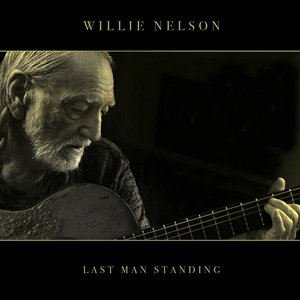Rating: 9/10
Eat your heart out, every Americana artist ever who has either bored me to death or failed to consistently sing on pitch for an entire performance because Willie Nelson, at the age of eighty-four, has just owned all of you. I’d like to hand deliver this record to all of you who, in your twenties and thirties, have half the vocal prowess and not an ounce of the charisma, with that simple message: “Owned.” As he says in a song from his last album, he “woke up still not dead again today,” so he apparently decided to bless us with another great record and embarrass a sizable chunk of the makers of independent music in the process.
As for that album, God’s Problem Child was a good record, and I stand behind my thoughts about it, but one listen to the opener and title track of this new one inherently and immediately makes me enjoy that album less. That album reflected heavily on the end of life, and the songs were well-written, but it didn’t really have too much staying power or relatibility for me. This one deals with many of the same subjects, but more often than not, they’re approached in a lighthearted, charismatic way. The aforementioned “Still Not dead” was a rare moment of levity on God’s Problem Child, but this record is mostly lively. The title track muses, “I don’t want to be the last man standing, oh wait a minute, maybe I do” and advises people to go ahead and leave “if you’re in such a hurry” because heaven and hell are both waiting. Heaven and hell appear again on “Heaven is Closed” as he remarks that “heaven is closed and hell’s overcrowded,” so he’ll just stay here on earth. He says he can hear someone calling him to come in from this world, which he calls “the craziness,” but still he remains here.
That craziness is the center of one of the albums’ best songs, “Me and You.” This deals with the current divisiveness of our world, and the genius in the writing here is that he says “it’s just me and you” against everyone, and then we find that he’s talking to himself. Another cool part is that he doesn’t take a specific political or social stance, so people on both sides of the divide can surely relate to this, to feeling like everyone else besides them has gone crazy, or that, as Nelson sings about a friend with whom he can no longer have discussions, “he ain’t got a lick of sense.” This is how to write a political song–this doesn’t divide or cause half an audience to hate it, it becomes something people from all backgrounds and political affiliations can get behind. Another moment of slightly less obvious political and social commentary comes in “Don’t tell Noah,” and again, this message could strike a chord with both sides, as he’s basically telling us all not to take positions on things about which we know nothing–“don’t tell Noah about the flood, don’t tell Jesus about the blood.” This one features some upbeat piano and harmonica which really add to its infectiousness.
This is just so much more fun and charismatic than Willie’s last album, and like I say, inasmuch as I don’t want to take away from that record, this inadvertently does just that by showing Willie Nelson in a more relatable light. Willie’s at his best when he’s doing these upbeat tunes like “Don’t Tell Noah” or the Western swing-influenced “Ready to roar.” I’ve already mentioned the piano and the harmonica, both integral parts of this record, but the great guitar licks sprinkled throughout this also add a lot of flavor to it. This swing/jazz-influenced country style suits Nelson more than the restrained, adult contemporary ballads which characterized his last album. Not only that, it makes the ballads, like “Something You Get Through,” stand out more, whereas they ran together some on God’s Problem Child.
And it’s worth noting that wile we have all these artists–like Joshua Hedley most recently, but he’s not the only one–trying so hard to be vintage and throwback that they’ve even adapted their songwriting to make it feel retro, here we have Willie Nelson using modern phrases like “it’s getting hard to watch my pals check out” in the title track, and owning an iPhone in “I Ain’t Got Nothin’.” The sentiments in Nelson’s songs remain timeless, and this slight modernization only adds an accessibility to his lyrics. I’m not saying doing this is vital, and indeed, some songs sound dated when they’re modernized too much, but the point is, not everything has to be retro to make it “authentic,” and often, the concentrated effort to make something so actually renders it the opposite, leaving the writing sometimes feeling unnatural. You’d be an absolute idiot to call Willie nelson anything other than authentic. I wonder what the throwback types think about the fact that Nelson and his songwriting partner and producer, Buddy Cannon, wrote most of this album by text…but I digress.
This is a great record on so many fronts. Willie Nelson still sounds good vocally, and his charisma is just ridiculous. I wrote that God’s Problem Child was a good record, but not probably an album that would make new Willie Nelson fans; this one undoubtedly has that potential, with its relatable songwriting and vibrant personality. Much like John Prine’s latest album, it paints the end of life in a humorous light and somewhat alleviates the fear of death. And like Prine, Nelson proves that artist can still have something meaningful, worthwhile, and yes, even relatable and entertaining to say no matter their age. This record will have staying power, and it will be in the conversation when December comes around.
